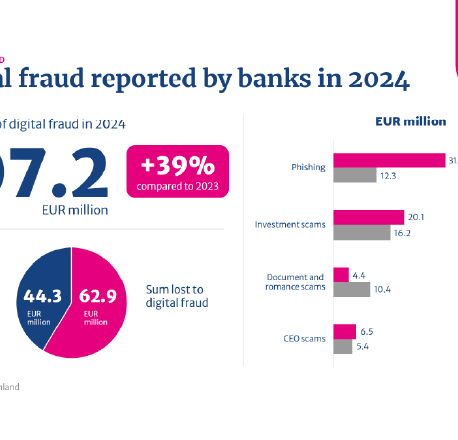
- Anti-fraud obligations should be extended beyond payment service providers.
- The Commission is considering increasing telecom companies’ fraud prevention obligations. This is reasonable and justifiable.
- Social media platforms and online marketplaces should also be required to implement anti-fraud measures.
- Current regulation impedes banks’ fraud-related information exchange. This makes it more difficult to prevent and investigate fraud.
- Finnish banks employ thousands of people in anti-money laundering and fraud prevention duties.
- Banks’ mutual information exchange is governed for example by banking secrecy rules and the General Data Protection Regulation (GDPR).
Current regulation impedes banks’ ability to exchange information on fraud cases. This makes it more difficult to prevent and investigate fraud.
“Finnish banks employ thousands of people in anti-money laundering and fraud prevention duties and are continuously developing their systems. Banks will not be turning their backs on their customers – but they could benefit from some help from the legislator”, says Finance Finland’s CEO Arno Ahosniemi.
The Commission has proposed a somewhat half-baked solution that would permit information exchange unless it is not prohibited by the General Data Protection Regulation (GDPR). The GDPR has a similar conditional clause that permits information exchange if it is required by other regulation.
It is unclear whether the Commission proposal is simply meant to enable information exchange in accordance with the statutes of the GDPR, or if the idea is to leave the matter open to interpretation and thus ultimately to the discretion of national data protection authorities, whose interpretations may differ from each other. In Finland, banks’ disclosure of customer data is governed by both the GDPR and banking secrecy rules.
“Finnish banking secrecy rules need to be amended to permit banks to exchange information related to the investigation and prevention of fraud. In Sweden, for example, legislation enables much more fluent inter-bank information exchange”, Ahosniemi notes.
Other service providers need to contribute to fraud prevention
Fraud prevention needs to involve the service providers through which fraudsters approach their victims – after all, banks do not get called on stage until the victim has already been lured in.
“Fraudsters typically contact their victims by phone, via text or e-mail messages, through online marketplaces or on social media. Having the tools to intercept attempts during these initial stages would enhance fraud prevention.”
At least certain types of fraud will become easier to prevent later this year: from October 2025, EU instant payments regulation will obligate the payer’s bank to verify that the beneficiary’s IBAN and name match and alert the payer to possible mistakes or fraud before the transaction is made. This makes it more difficult for fraudsters to scam money for example by posing as a legitimate online store. However, customers will still need to stay alert when reading and reacting to messages from their payment service provider.
In the last two and a half years, Finns have lost over €100 million to digital fraud. Over the same period, banks were able to stop and recover €65 million that was about to be transferred to criminals.
Fraud losses have been growing steadily not just in Finland but in all of Europe for the entire time the statistics have been collected. Finance Finland has compiled fraud data from Finnish banks since January 2022.
“The volume of fraud was very high in the first half of last year. We’re still waiting for the full 12-month data, but unfortunately it seems that 2024 was yet another record-breaking year in fraud”, says Ahosniemi.
Steer clear of scams!
If you receive an even slightly suspicious offer or message, ask yourself the following questions before you act:
- What e-mail domain or telephone area code did the message come from?
- Were you expecting to receive the message?
- Is this how a Finnish authority or institution would communicate?
- Does the message contain misspelled words or weird language?
- Is the offer too good to be true?
- Why does the sender want you to act urgently?
If you suspect you’ve been defrauded, do the following:
- First and foremost, call the Finnish banks’ 24/7 blocking service or your own bank’s customer service to block access to your card or account. Quick action can prevent or at least mitigate damages.
- Report the offence to the police.
- Don’t suffer alone. Anyone can fall victim to fraud – there is no need to be ashamed of it. Reach out to friends and family and seek professional help, if necessary.
Still have questions?
|Contact our experts
Looking for more?
Other articles on the topic

Finnish financial sector and authorities tested their ability to operate under severe disruptions and emergency conditions

Fraud must be tackled at the source – Social media platforms and online marketplaces need to be involved in fraud prevention

Volume of digital fraud skyrockets in Finland – Banks blocked more than €44 million’s worth of fraud-related payments in 2024

The Commission must tighten the screw on fraud prevention – Social media platforms and online marketplaces must also be involved




